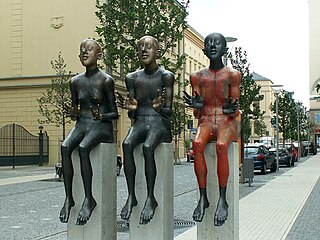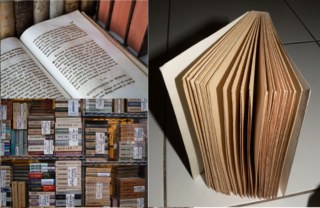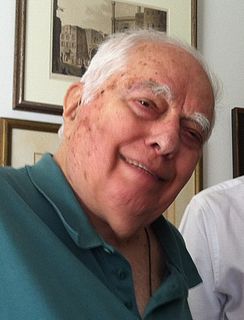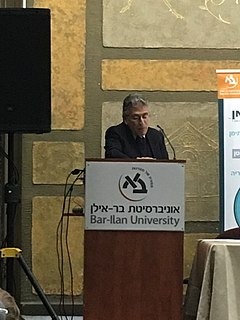Antisemitism in the Arab world increased greatly in the 20th century, for several reasons: the breakdown of the Ottoman Empire and traditional Islamic society; European influence, brought about by Western imperialism and Arab Christians; Nazi propaganda; resentment over Jewish nationalism ; and the rise of Arab nationalism.
A dhimmī is a historical term referring to non-Muslims living in an Islamic state with legal protection. The word literally means "protected person", referring to the state's obligation under sharia to protect the individual's life, property, and freedom of religion, in exchange for loyalty to the state and payment of the jizya tax, which complemented the zakat, or obligatory alms, paid by the Muslim subjects. Dhimmis were exempt from certain duties assigned specifically to Muslims, and did not enjoy certain privileges and freedoms reserved for Muslims, but were otherwise equal under the laws of property, contract, and obligation.

Freedom of religion is a principle that supports the freedom of an individual or community, in public or private, to manifest religion or belief in teaching, practice, worship, and observance. It also includes the freedom to change one's religion or beliefs.

Uriel da Costa, Uriel Acosta or d'Acosta was a Jewish philosopher and skeptic who questioned the Catholic and Rabbinic institutions of his time.
Islam and antisemitism relates to Islamic theological teachings against Jews and Judaism and the treatment of Jews in Muslim communities.
Islamic–Jewish relations started in the 7th century AD with the origin and spread of Islam in the Arabian peninsula. The two religions share similar values, guidelines, and principles. Islam also incorporates Jewish history as a part of its own. Muslims regard the Children of Israel as an important religious concept in Islam. Moses, the most important prophet of Judaism, is also considered a prophet and messenger in Islam. Moses is mentioned in the Quran more than any other individual, and his life is narrated and recounted more than that of any other prophet. There are approximately 43 references to the Israelites in the Quran, and many in the Hadith. Later rabbinic authorities and Jewish scholars such as Maimonides discussed the relationship between Islam and Jewish law. Maimonides himself, it has been argued, was influenced by Islamic legal thought.

Toleration is the acceptance of an action, object, or person which one dislikes or disagrees with. Random House Dictionary defines tolerance as "a fair, objective, and permissive attitude toward those whose opinions, beliefs, practices, racial or ethnic origins, etc., differ from one's own". Toleration may signify "no more than forbearance and the permission given by the adherents of a dominant religion for other religions to exist, even though the latter are looked on with disapproval as inferior, mistaken, or harmful."
Religious antisemitism is aversion to or discrimination against Jews as a whole based on religious beliefs, false claims against Judaism and religious antisemitic canards. It is sometimes called theological antisemitism.

Over the centuries of Islamic history, Muslim rulers, Islamic scholars, and ordinary Muslims have held many different attitudes towards other religions. Attitudes have varied according to time, place and circumstance.
Jewish history in the Middle Ages covers the period from the 5th to the 15th century. During the course of this period, the Jewish population gradually shifted from the Mediterranean Basin to Eastern Europe.
Jewish communities have existed across the Middle East and North Africa since Antiquity. By the time of the Muslim conquests of the 7th century, these ancient communities had been ruled by various empires and included the Babylonian, Persian, Carthaginian, Greek, Roman, Byzantine, Ottoman and Yemenite Jews.
Hakham Bashi is the Turkish name for the Chief Rabbi of the nation's Jewish community. In the time of the Ottoman Empire it was also used for the chief rabbi of a particular region of the empire, such as Syria or Iraq, though the Hakham Bashi of Constantinople was considered overall head of the Jews of the Empire.
La Convivencia is an academic hypothesis regarding the period of Spanish history from the Muslim Umayyad conquest of Hispania in the early eighth century until the expulsion of the Jews in 1492. It claims that in the different Moorish Iberian kingdoms, the Muslims, Christians and Jews lived in relative peace. According to this interpretation of history, this period of religious diversity differs from later Spanish and Portuguese history when - as a result of expulsions and forced conversions - Catholicism became the sole religion in the Iberian Peninsula.

The Patent of Toleration was an edict of toleration issued on 13 October 1781 by the Habsburg emperor Joseph II. Part of the Josephinist reforms, the Patent extended religious freedom to non-Catholic Christians living in the crown lands of the Habsburg Monarchy, including Lutherans, Calvinists, and the Eastern Orthodox. Specifically, these members of minority faiths were now legally permitted to hold "private religious exercises" in clandestine churches.

Petrus Alphonsi was a Jewish Spanish physician, writer, astronomer, and polemicist, who converted to Christianity in 1106. He is also known just as Alphonsi, and as Peter Alfonsi or Peter Alphonso and was born Moses Sephardi). Born in Islamic Spain, he mostly lived in England and France after his conversion.
There is a small Jewish community in United Arab Emirates (UAE), which worships freely in a dedicated synagogue in Dubai and has done since 2008. Visitors are also welcome to attend and pray there. Its existence is supported by the UAE's strong policy of tolerance, with the appointment of a Minister for Tolerance in 2016 leading to the creation of the National Tolerance Programme.

Jews or Jewish people are an ethnoreligious group and a nation, originating from the Israelites and Hebrews of historical Israel and Judah. Jewish ethnicity, nationhood, and religion are strongly interrelated, as Judaism is the traditional faith of the Jewish people, while its observance varies from strict observance to complete nonobservance.
Jewish polemics and apologetics in the Middle Ages were texts written to protect and dissuade Jewish communities from conversion to Christianity, or more rarely to Islam. The terms polemics and apologetics may be distinguished but may also be considered somewhat subjective. A smaller number of proselytizing text also exists intended to convert Christians, or more rarely Muslims, to Judaism.
David Nirenberg is an American historian, Dean of the Divinity School, and Deborah R. and Edgar D. Jannotta Distinguished Service Professor of Medieval History and the Committee on Social Thought at the University of Chicago, as well as the former Executive Vice Provost of the University, Dean of the Social Sciences Division, and the founding Roman Family Director of the Neubauer Family Collegium for Culture and Society. He has a particular interest in Christian, Jewish, and Muslim thought in Medieval Europe. In addition to the Committee on Social Thought and the Department of History, he is also appointed in the Divinity School and the Department of Romance Languages and Literatures, the Center for Middle Eastern Studies, the Joyce Z. and Jacob Greenberg Center for Jewish Studies, and the College of the University of Chicago.











